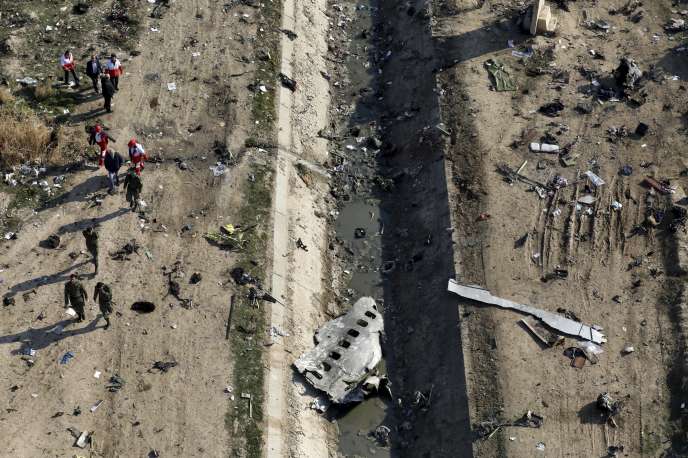
Since early January, in the case of the crash of Ukrainian International Airways flight 752, which was the target of an Iranian missile fire, a revelation has been chasing another about the degree of responsibility of Tehran. The latest one risks causing a diplomatic crisis between Kiev and the Islamic Republic. On Sunday February 2, a recording broadcast by Ukrainian television confirmed in Kiev that the Iranian civil authorities were aware of the real cause of the disaster at the very moment it occurred, contrary to what they claim since the incident.
In the days which followed the incident, the Iranian direction of the civil aviation had indeed defended the thesis according to which the crash of the boeing 737 which killed 176 people, mainly of Iranian and Canadian nationality, near Tehran had been caused by a technical incident.
"Individual error"
Faced with pressure from states that lost nationals in the disaster and defending the thesis of a missile fire, officials of the Revolutionary Guards finally admitted on January 11 that the plane had been taken for a hostile aircraft and shot down because of a "Individual error". A few hours earlier, their forces, which constitute the regime’s ideological army, separate from the conventional armed forces, had fired a missile salvo at American installations in Iraq in retaliation for the assassination of General Ghassem Soleimani in Baghdad. A Washington response was still a possibility, and the Revolutionary Guards, who are accountable only to the Guide to the Islamic Revolution, were in charge of Iran's air defense.
"A series of lights like … yes, it's a missile, something is happening? "Worries the pilot
The government of moderate President Hassan Rohani has repeatedly said since that during the three days that the military authorities were silent, the civilian authorities had been kept in the dark as to the true causes of the accident. Sunday, the broadcast by the Ukrainian television channel 1 + 1 of the recording of a conversation between an airline pilot flying over Tehran and an air traffic controller brings new elements, of a nature according to Kiev, to demonstrate the contrary . The remarks exchanged between the two men evoke precisely a missile firing which the pilot witnesses from the cockpit of his plane, which approaches Tehran coming from the city of Shiraz, in the south of the country.
"A series of lights like … yes, it's a missile, something is happening? " worries the pilot, who later insists: "It's the light of a missile. " He later evokes an explosion. The location described by the pilot as the place of origin of the shots corresponds to the area in which the aerial battery used to target the Ukrainian aircraft was located. In the course of the recording, the air traffic controller tried to contact the aircraft of Ukraine International Airways, without success. Hit by missile fire, the boeing has already started to fall.

Ukrainian President Volodymyr Zelensky has confirmed the authenticity of the tape broadcast by the television channel, which claims to have obtained it from a source in the country's intelligence services. The Iranian team investigating the crash, Hassan Rezaiefar, said on Monday that the tape was transmitted by Tehran to Kiev.
Iranian authorities denounced the publication of the tape, which they claimed was part of a confidential file, and said they no longer wanted to share evidence with Kiev. "The recording shows that the Iranian side knew from the start that our plane had been shot down by a missile, it was aware of this from the moment the shooting took place," said the Ukrainian president on an accusing note.
Insufficient compensation
The release of the tape, which is believed to reveal a new public lie by Iranian authorities, comes as the investigation of the incident becomes a source of growing tension between Tehran and Kiev. Zelensky also said on Sunday that Iran's proposed compensation, $ 80,000 per family, he said was not enough.
In addition, in the days following the Revolutionary Guards' public recognition of their responsibility for the crash, Iran had officially shown signs of openness to a form of international cooperation around the upcoming investigation into the crash, including the States affected by the disaster and other powers, who have recognized expertise in civil aviation. However, such collaboration did not materialize. After showing willingness to send the flight recorders, or "black boxes," found at the crash site to Ukraine, the Iranian authorities withdrew without giving reasons.




